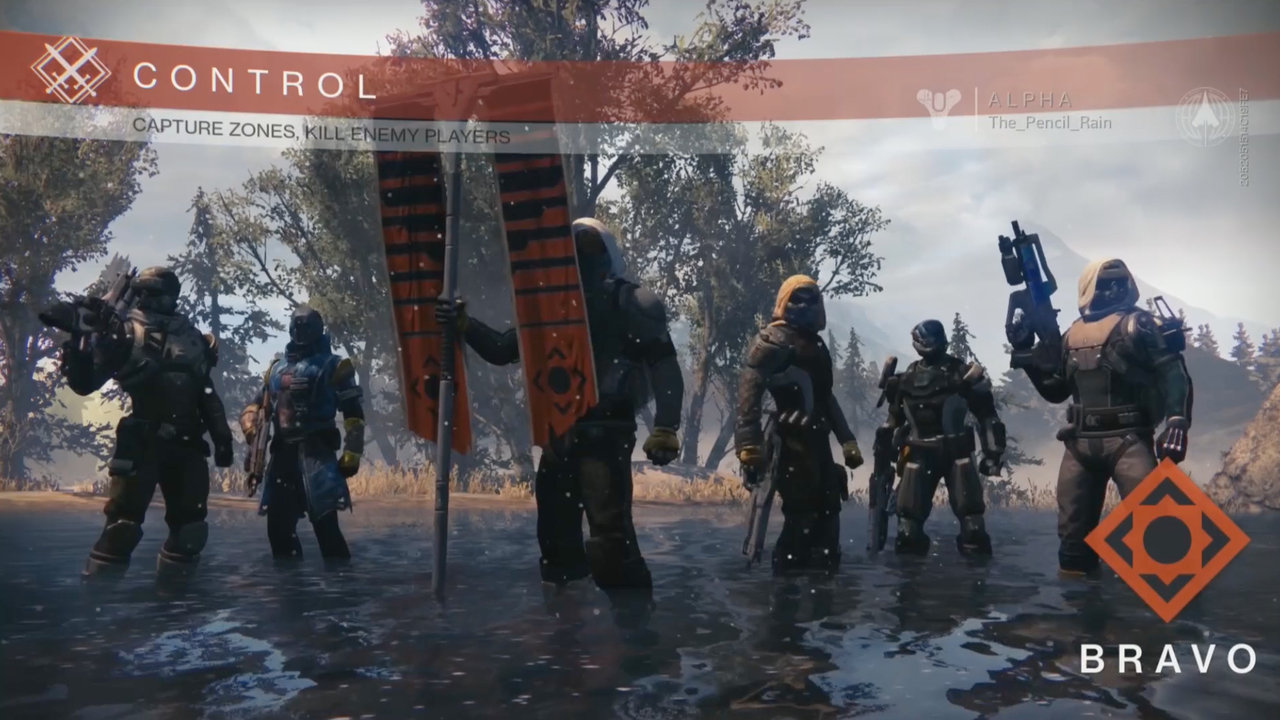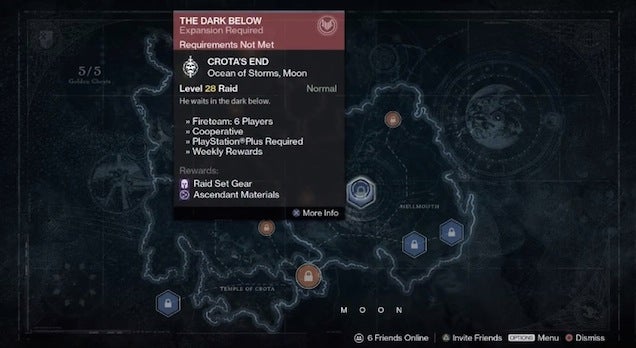Destiny: What Went Wrong
Part 2
For dedicated fans of Bungie, the company has always been synonymous with extremely popular multiplayer games. Halo 2, launched ten years ago, pioneered the Xbox’s online service, Xbox Live, and helped became a source for some of Xbox’s future online titles. Future titles, including Halo 3 and Halo: Reach, continued to define the Xbox multiplayer scene for several years, though with varying degrees of success.
With Destiny, Bungie has aimed to redesign online shooters once again for the next generation of gaming. However, the game’s multiplayer is largely anonymous is a growing market of shooters. Offering only four permanent game modes, three of which are varying types of slayer, Destiny completely drops most of the customization for multiplayer matches that made Halo great, including custom game options that define many of the most popular online games for both the Xbox and PlayStation systems. Your only objective type game in Destiny is Control, a territories like mode that, essentially, plays like slayer with only a very thin layer of objective gaming on top. There is no Capture the Flag, or Infection, or these staple playlists that are predominant in most video games, for a good reason. They offer a change in pace from traditional "run and shoot" gameplay. which is all Destiny offers.

On top of the lack of game modes, Destiny also lacks a dedicated multiplayer ranking, as your characters rank is shared between all aspects of the game. This creates problems when attempting to match players of equal skill level, as players who mostly play strikes and raids could go into a Rumble match and be put against players who spend all their time fighting in the Crucible. On the opposite end of this argument is the sheer fact that Destiny's multiplayer requires very little skill whatsoever - I've gone into a match and just spammed the trigger button until my super filled up, and by the end of the game, I was top scoring player. There is no challenge, no drive to get better, no honest competitive nature.
With the lack of these custom options, the lack of a dedicated ranking system for only multiplayer, and a surprising lack of any learning curve, Destiny’s multiplayer comes off as an extremely anonymous and irrelevant mode in an expanding gaming universe where, if a game wants to truly thrive, it has to take the most popular components and add unique touches to stand out - and for good reasons. Bungie apparently lost that memo during their move.
Marty O’Donnell. To fans of Bungie’s gaming legacy, the name is immediately identifiable: For ten years, Marty helped to craft some of gaming’s greatest musical works in the Halo series. From the beautiful monks serenading you on the title screens of the three original games, to the jazz band creating an ominous tone in the darkened streets of New Mombasa as you searched for your abandoned squad - Marty O'Donnell's music elevated Halo to a new level in the gaming world.
During the months and years that followed the release of Halo: Reach, as the company began working full throttle on Destiny, Marty turned to one of music history’s greatest icon, Paul McCartney, to assist in the creation of music for the new franchise. Fans were alight with speculation as to what the mega duo (Trio, if you include Michael Salvatori, O’Donnell’s longtime partner) would come up with and how they could possibly top the masterpieces of the Halo universe. In one of his final interviews as a Bungie employee, for the January 2014 GameInformer magazine, Marty pleasantly describes working with McCartney, as well as his aim for Destiny's music. The video of said interview can be seen
hereThen, the glass floor broke, and fans were stunned to learn the news that Marty O’Donnell, a veteran of Bungie since the early days of the company, had been terminated in April of this year. There was no warning, no indication that things had gone bad, prior to the extremely abrupt news. On April 16th, 2014, Marty O'Donnell released a
tweet at 12:28 AM EST, stating:
I'm saddened to say that Bungie's board of directors terminated me without cause on April 11, 2014.
Notice, that the tweet indicates that the firing occurred five days prior to the news unveiled by Marty himself. Roughly an hour and a half later, Bungie
released a measly four sentence news post confirming that Marty was no longer employed at the company.
Fans, longtime fans, were livid with Bungie. The Bungie forums became a war zone of fans demanding answers, demanding how such a close knit company had fired such a longtime, outstanding member who's work defined the games the company worked on. No answers has been publicly released, however Marty O'Donnell has won several court cases against Harold Jones, President of Bungie, allowing the former employee to regain wages never paid to him and held back with his termination. There is currently no word as to whether Marty will rejoin the gaming industry, working for a new company.

Let's be honest - as video game fans, we are used to downloadable content, also known as DLC. These add-on's to your current game, which have become more prominent in recent years thanks to the increasing popularity of online shops on home consoles, can include new maps, story missions, playable characters, weapons, skins - whatever publishers and developers can find a way to add and charge for. To a point, DLC is perfectly reasonable.
However, cutting whole chunks of playable area of a game, and then charging for access to these areas of the game, which are already on the disk. Welcome to the problem with Destiny DLC.
Prior to the game's release, Bungie and Activison unveiled two future DLC packs - The Dark Below, slated for a December 2014 release, and House of Wolves, slated for a release sometime in 2015. Both packs cost $19.90 individually, and contain exclusive content for the PlayStation 4 (More on that below). However, thanks to glitches in the game, players have already been able to not only view mission details on the world map when selecting a story mission, but also gain access into areas of the game that are relevant to the DLC – some of which are extremely detailed and complete.

This process of cutting out nearly completed content from a game in order to charge a pricy fee, in this case 1/3 the price of an actual retail game for little content, is extremely risky behavior, in that it sets precedent for other companies and publishers who will look at Destiny's success with this model and say "Hey! They've sold a shit ton of DLC from just cutting out chunks of the game! Maybe we should look into doing that to save a bit of time!"
On top of that, there is also the component of the future DLC containing Sony exclusives through, at the very earliest, Fall 2015. What this means, in laymen terms, is that you don't get access to everything you're paying a premium for, for an additional 8-10 months. Yes, this is the business of the gaming industry, but that does not mean it is any less upsetting or that we should simply allow it to happen.
Overall, Bungie post-Destiny release is quite similar to the situation 343 Industries had following the release of Halo 4. Both were extremely hyped and anticipated games that were heavily pushed by their respective publishers. However, as each game launched and fans found the plethora of flaws and problems that awaited them, both companies found themselves essentially pushing a boulder up a steep hill to try and regain face.
Key difference: 343i has a well established franchise to fall back on, Bungie no longer does. If they want Destiny to become a true contender in the video game field, they need to go back and look at the problems across every aspect of the game, actually address the fans concerns, and maintain some level of transparency as they move forward and work on repairing what is, arguably, a broken shell of a potentially great game.
Can they do it? We'll just have to wait and see.
Project Oversight is an editorial look at some of the gaming industries biggest releases and their flaws, addressing the criticisms surrounding various problems in the game and/or series, exclusively written by IcyWind for Sep7agon.net. The next series to come under the knife, a personal favorite of mine, is Kingdom Hearts - the wildly popular Japanese RPG franchise that meshes Disney with Final Fantasy. The first issue will be coming soon.